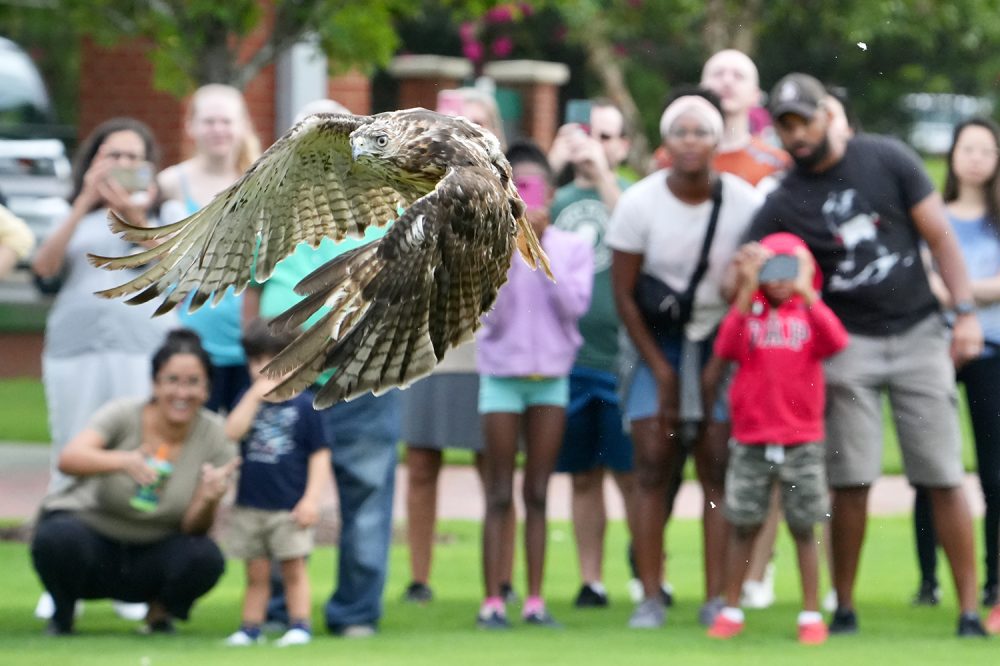
Charlotte Student Chemistry Team Named as Nationwide Finalists in Collegiate Inventors Competition
Two UNC Charlotte Klein College of Science students were announced today as team finalists in the Collegiate Inventors Competition, from the National Inventors Hall of Fame.
Students Naz Fathma Tumpa, a nanoscale chemistry Ph.D. student, and Aiden Hawkins, a senior chemistry major working toward a bachelor’s of science degree, have been working with advisors Michael G. Walter and Tyler J. Adams. Tumpa and Hawkins are representing UNC Charlotte as one of five teams of students to make it to the finals in the nationwide contest. The Collegiate Inventors Competition also includes a People’s Choice Award, with $2000 for the winning team and patent acceleration.
The four other graduate-level finalist teams are from University of Pittsburgh, University of Illinois Urbana-Champaign and two teams from Massachusetts Institute of Technology.
The team, working in the Walter lab, is presenting an innovative drug testing solution “Color-Metric Sensing of Amine Compounds for Illicit Drug Detection.” Using a bright, color-changing solution, they can test for drugs like fentanyl, heroin and cocaine, which all contain an amine compound.

“When we add our product in the illicit or illegal drug, it actually reacts with the drug and it changes color to blue or sometimes purple,” said Tumpa.
“We hope the impact of this invention is a decrease in the amount of fentanyl that is on the streets,” said Hawkins.
Tumpa and Hawkins will travel to Washington, DC in mid-October on an all-expenses-paid trip to meet with patent examiners to pitch their work and network for national exposure with other inventors and mentors. The event will be held at the United States Patent and Trademark Office headquarters in Alexandria, Virginia.
“I’m thrilled for our Klein College of Science students to be named as finalists in this nationwide competition, among impressive competitors,” said Klein College of Science Founding Dean Bernadette Donovan-Merkert. “The research conducted in the Walter lab is fascinating and offers advancements across a variety of applications. We are proud to have Naz and Aidan representing the innovative research at UNC Charlotte and we will be cheering them on in October.”

As the number of lives affected by illegal or inappropriate drug use continues to rise, this invention can help by offering a new way to detect illicit drugs by testing for the amine in a sample. The test is cost-effective and uses photoreactive dyes encased in a nontoxic, hydrophilic, biocompatible and biodegradable hydrogel polymer film to quickly and easily oxidize amine-containing compounds to produce vibrant changes in color and fluorescence.
“The entire Walter lab and myself are so proud and excited for Naz and Aiden, and the impactful work they’ve embarked upon,” said Professor of Chemistry Michael Walter, Ph.D. “Our lab has been leading the effort of developing high-performance, color-changing, fluorescent materials while staying alert for new sensing applications. We are excited about the chemistry and very hopeful that this technology can make a big impact and help to address the many challenges of the fentanyl and opioid epidemic,” said Walter.
The team is excited for this innovation and the impact it could have nationally on people’s lives. “Being in science, being a researcher, is rewarding, because it’s actually helping people–science is everything,” said Tumpa.

“I really love progress, moving the needle, pushing the boundary, getting farther with the knowledge we have already and what we will end up discovering,” said Hawkins.
“After watching and working daily with Naz and Aiden, I’m incredibly excited and happy that their hard work, determination, and critical thinking through NSF I-corps, laboratory research, and long days of prototyping have paid off on the national stage,” said Tyler Adams, a chemistry postdoctoral fellow in the Walter lab. “I can already see their future accomplishments and impact they will have on the world.”
Naming Ceremony Honors Fred and Gené Klein’s transformational $10 Million gift
On September 24, UNC Charlotte recognized a transformational $10 million gift from Gené and Fred Klein by naming the Klein College of Science and dedicating the Science Building as Klein Hall. The event was held under a large tent in front on the building’s front lawn to a crowd of University and community leaders, students, faculty, and supporters of the Kleins.
In her remarks, Chancellor Sharon L. Gaber connected the Klein’s support to the success of the University. “Fred and Gené understand how UNC Charlotte’s success and our region’s success go hand in hand,” said Gaber. “The generosity of the Klein family allows us to further amplify the innovations and discoveries at Charlotte as we set our course to become a preeminent public research university.”
“This investment from Fred and Gené Klein we celebrate today will help provide the resources we need to continue our momentum as this region’s great public research university,” said Gaber.
Jennifer Troyer, provost and vice chancellor for academic affairs, outlined the formation of the College of Science last year, when two new colleges were formed from the College of Liberal Arts & Sciences to create focused pathways for student and research success. “The College of Science is fundamental to high-impact research,” said Troyer. “A world-class College of Science will help us attract top-tier faculty, secure grants, train future scientists and elevate student learning at all levels.”
Klein College of Science Founding Dean Bernadette Donovan-Merkert discussed how UNC Charlotte is the ideal environment to bring vision to fruition. “The Klein College of Science is a collaborative community dedicated to supporting success for all students in their exploration of science and mathematics–even if it’s not their major– to create an inquisitive, scientifically literate society,” said Donovan-Merkert.
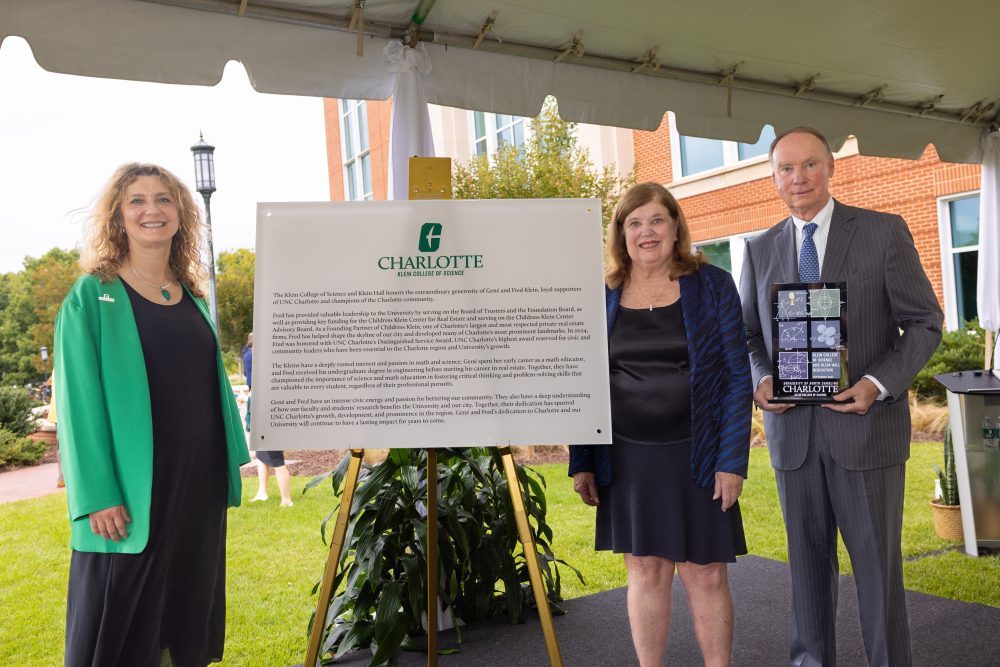
To illustrate that, Donovan-Merkert highlighted two successful students in the audience: Dhairya Desai, a double major in biology and chemistry, Levine Scholar and winner of the Newman Civic Fellowship; and Kaitlin Klotz, a biology Ph.D. student who was the winner of the best poster on Infectious Disease at the Biomedical Sciences symposium this month and is an active campus leader as the president of the Graduate and Professional Student Association.
Donovan-Merkert said the College will use the investment from the Klein’s to be a nest egg to launch the college, supporting merit scholarships, two new endowed professorships and the research needs of faculty. The endowed professorships will be created for the departments of Mathematics and Statistics and Physics and Optical Science. The gift will “elevate our ongoing work, lead future campus research, and expand community collaborations, such as our K-12 initiative to help train science and math teachers in experiential workshops for lessons they can take back to their own classrooms,” said Donovan-Merkert.
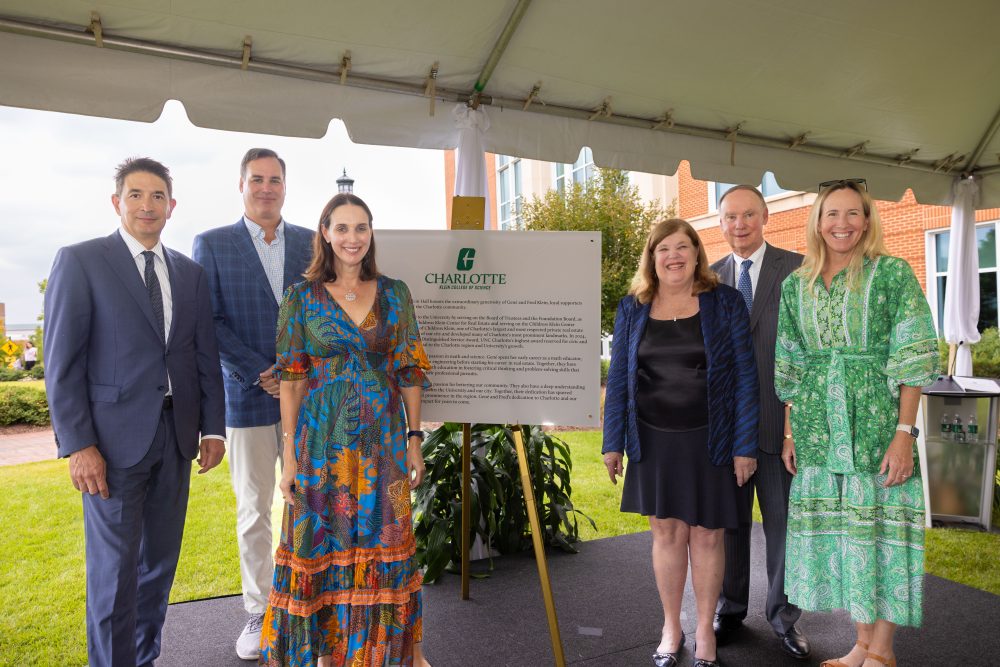
“In addition to our three existing research centers, we are also moving the Center for Biomedical Engineering and Science, which was established nearly 20 years ago, into our college,” said Donovan-Merkert. “This center will be a hub for innovation in the life sciences on our campus, and it will expand our partnership ability with companies and initiatives in the Charlotte region and beyond.”
Fred Klein spoke to the audience about how he and Gené are passionate about math and the sciences as their first interests, and were compelled to support the establishment of a brand new college. “We saw this as an opportunity to really jump start the program here with significant funding,” said Fred Klein.
Klein also thanked the faculty in the audience. “I hope you know how important your efforts are to the success of the school and how much it’s appreciated by the business community– what you do and what you’ve done– to make the school what it is today,” said Klein. He then challenged the Klein College to produce a Nobel Prize winner in the next 20 years and he joked that he would return to campus in a vehicle developed through technology from the College in a body that hadn’t aged due to discoveries in the College.
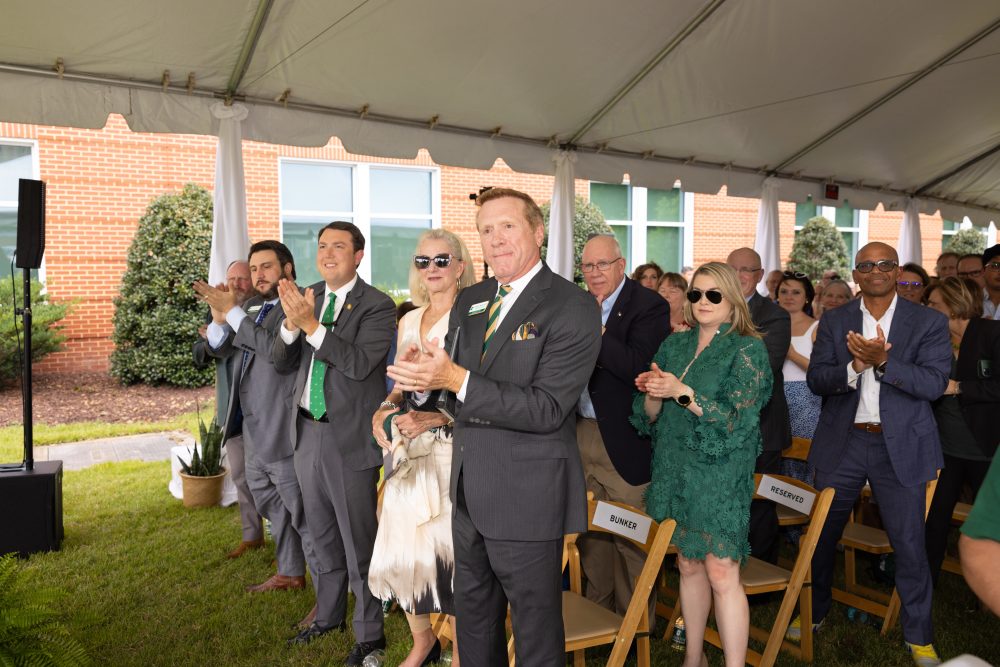
Dennis Bunker, chair of the UNC Charlotte Board of Trustees, thanked Gené and Fred Klein for their visionary leadership and longstanding commitment to the University, and presented them with a replica of a portion of the artwork featured in the Science building, which was designed by students and faculty.
Chancellor Gaber and Fred Klein unveiled the plaque that will hang in the lobby of Klein Hall to recognize the Klein family’s generosity. Chancellor Gaber closed the program by thanking the Kleins and said she took note of the challenge he issued for Charlotte to continue to rise through the national rankings in the next 15 years.
A reception was held in Klein Hall after the program and tours were given of the building and the McMillan Greenhouses, which are also part of the Klein College.
Susan K. Michael awarded prestigious UNC Charlotte Award for Teaching Excellence
On September 6, Susan K. Michael, senior lecturer in the Department of Chemistry, was awarded the 2024 UNC Charlotte Award for Teaching Excellence. The UNC Charlotte Award for Teaching Excellence is one of the most important and prestigious traditions at UNC Charlotte, honoring outstanding non-tenure track teachers on campus. John Taylor, teaching professor in the Department of Mathematics and Statistics, was also honored as a finalist at the awards ceremony.
“I am overwhelmed with joy right now. There’s an African proverb that says ‘If you want to go fast, go alone. If you want to go far, go together,” Michael said to the audience during her acceptance speech. Michael credits the people around her, including amazing students and numerous colleagues, for helping her get this far.

Michael has a B.A. from Augustana College and a M.S. from UNC Charlotte. She had to adjust to calling her former professors by their first names when they became her colleagues. In a career of 38 years of teaching, she has taught full time at Charlotte for 26 years, educating over 10,000 students in introductory lectures and labs. She regularly teaches multiple sections of General Chemistry I (CHEM 1251), a large lecture course with enrollment of around 180 students. Despite students generally considering this to be one of their most challenging courses, they praise Michael’s teaching style as informative, passionate and inspiring.
“Students are going to make the future world we live in, and to have a hand in shaping that is a privilege. Working with each one to see how they grow is also a privilege,” Michael said.
As to her teaching approach, she said “I try to review often so that things we’ve already learned can be stepping stones to new material. The lower I can make the barriers to chemistry, the easier it will be for students to learn more material, to retain what they already know and increase their confidence,” said Michael.
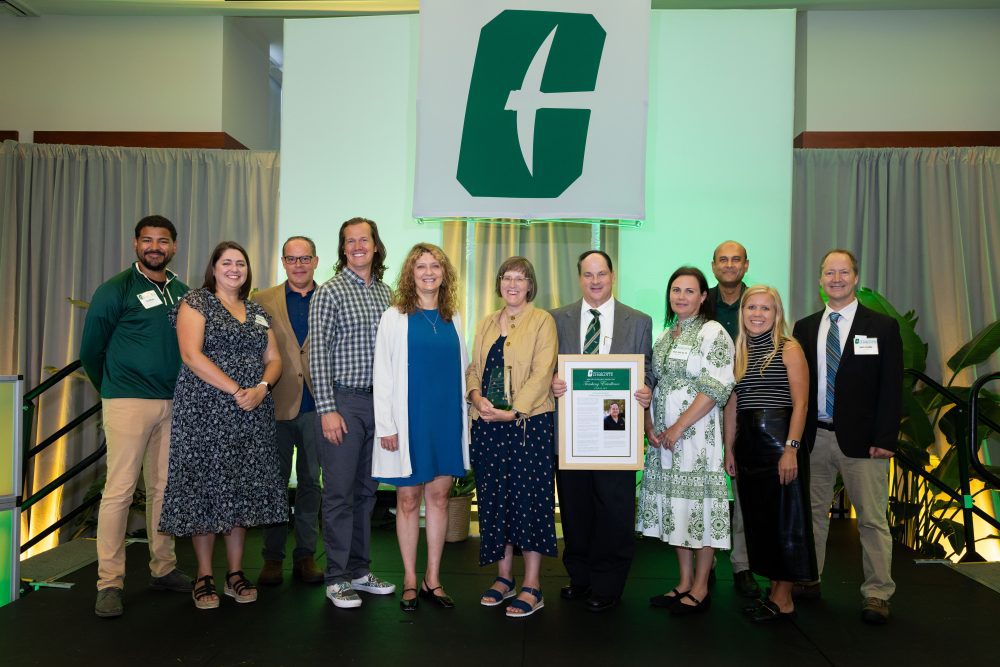
Likewise, Michael’s faculty peers recognize her teaching techniques as “intentional, well planned and wonderfully executed,” and she often serves as mentor to new teaching faculty, including visiting faculty and full-time teaching professors. Michael has served as the Department of Chemistry’s Advising Coordinator since January 2013, providing over 200 advising meetings per year to well over 2,000 students. She has also been the face of the department to new students for the past decade, attending EXPLORE open houses, admitted student days, new student orientations and other recruiting sessions.
“Susan Michael is an exceptional teacher and very deserving of the UNC Charlotte Award for Teaching Excellence,” said Bernadette Donovan-Merkert, dean of the College of Science. “We value her contributions to creating a supportive learning environment and the impact she has made through a career of dedication to our students.”
As part of a small team, Michael helped establish CHEM 1200: Fundamentals of Chemistry, an introductory course providing the foundation for subsequent success in CHEM 1251 for students with little or no chemistry background. Michael was the first instructor in Fall 2011, and has continued to help refine the course over the years.
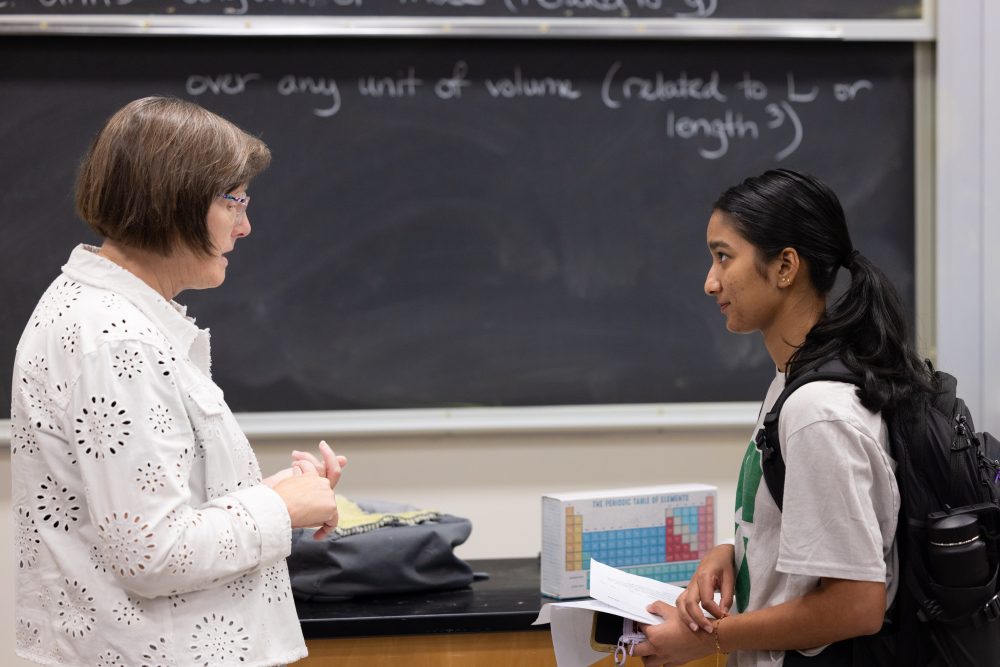
In addition to her teaching responsibilities, Michael has served as the CHEM 1252L lab coordinator and the CHEM 1251 lecture coordinator for many years. As lab coordinator, she has trained and supervised all graduate teaching assistants and implemented or modified countless labs in the curriculum, and as lecture coordinator, she coordinates syllabi, Canvas pages, in-class quizzes and handles all the communications with publishers and online content providers.
“Every time I rotate into CHEM 1251 for a semester, I am always amazed by the amount of work that Susan puts into coordinating the course and how much she does to assist the other instructors, including me,” said Thomas A. Schmedake, professor and chair of the Department of Chemistry.
Michael said that these days, she’s inspired by Coach Andy Reid of her beloved Kansas City Chiefs, “He’s not a young man, just like I’m not a young woman, but he is able to motivate his players to get the best out of them and change his strategies for maximum success.”
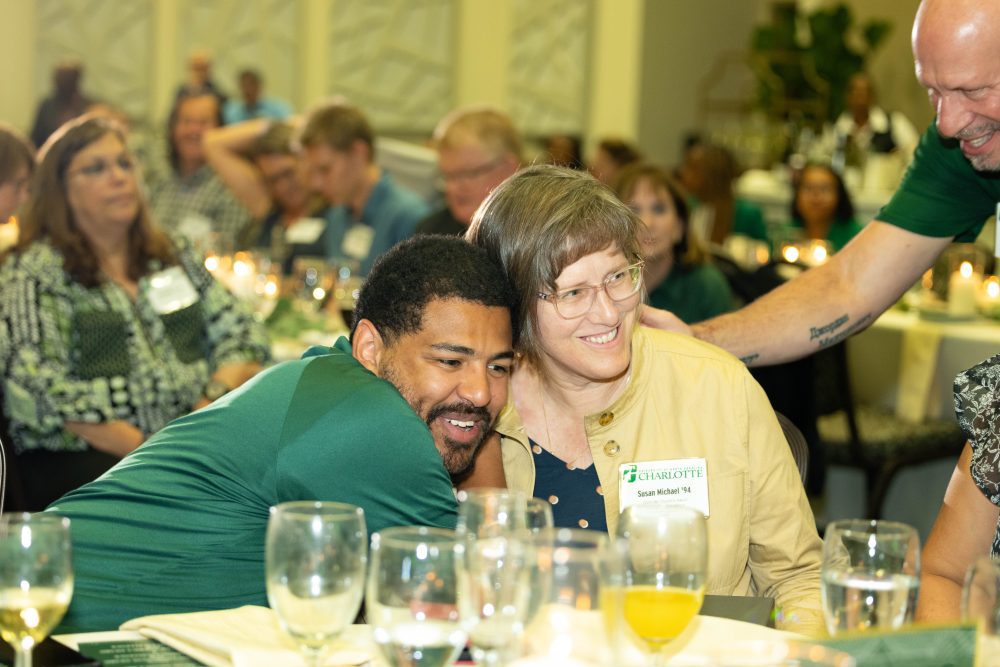
She has been fundamental in many curriculum and instructional development projects within the Department of Chemistry and has been continuously engaged in learning and implementing new teaching methods. As the leader in digital integration of the Department of Chemistry laboratory courses, she led the successful transition to online laboratories for CHEM 1252L: General Chemistry II Laboratory during the COVID-19 pandemic.
“Transitioning in-person, hands-on learning experiences to a meaningful online experience was a near-impossible task, but she somehow accomplished it with little prep time and no foundation to build from,” said Schmedake. Michael has since worked with publishers to implement the use of LabFlow into the CHEM 1252L curriculum to provide pre-lab preparation and post-lab coaching, continuing to maximize the student learning experience.
New DNA Repair Research May Influence Cancer Clinical Trials ‘For Years To Come’
On the road to future cancer treatments, Shan Yan. Ph.D., is blazing his own path.
That was evident recently when – as published in Nature Communications – Yan and his research team at UNC Charlotte broke new ground in the functional understanding of the protein APE1 that jumpstarts human DNA damage repair.
The findings could prove vital to future clinical trials, enabling scientists to possibly test whether therapeutic targeting of naturally occurring but overactive APE1 could improve cancer survival rates.
The work has already been heralded as a “breakthrough study.” And, the paper represents the very latest published findings from Yan and his NIH-funded lab, which has gained prestigious funding, awards, and international recognition over the last decade.
Central to Yan’s ongoing research is the study of DNA single-strand break (SSB) repair and signaling pathways. By contrast, much of today’s approach to fighting cancer stems from past research on DNA double-strand break (DSB) – a lethal type of DNA lesion, long-targeted in cancer therapies.
Pioneering inquiries, however, show that SSBs can foreshadow the development of more lethal DNA damage. Yet, due to lagging research, little was previously known about APE1’s function – what Yan now calls the “molecular switch” that effectively turns on a cell’s attempt to repair SSB damage.
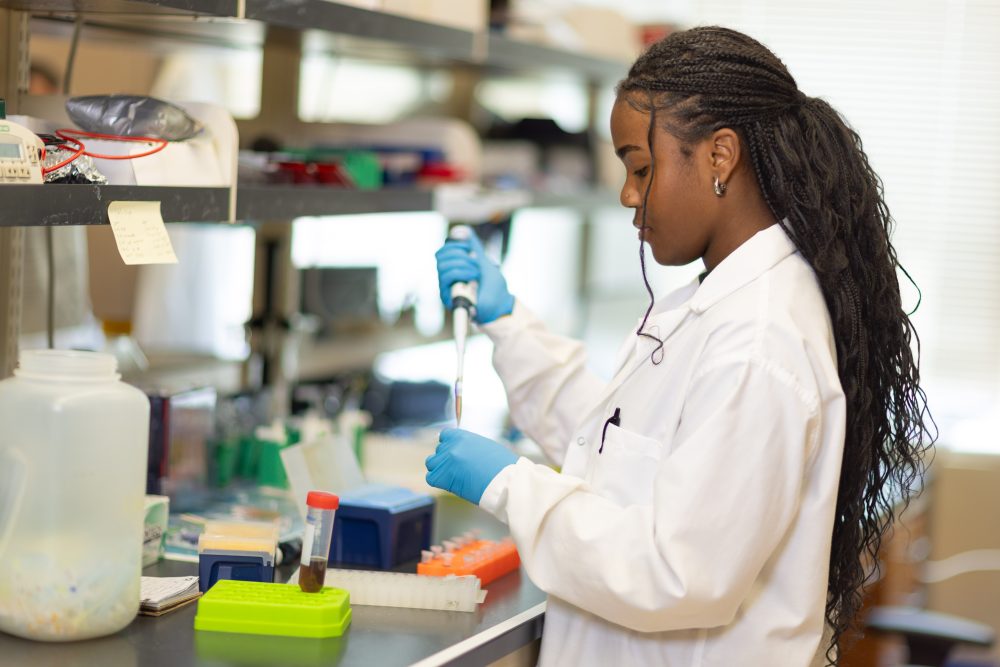
Yan, professor and associate chair for research in the Department of Biological Sciences, said researchers previously “lacked the technical advancement – this complicated design – to study this question.”
So, as Yan has become known for, he made a path where there was none.
An earlier breakthrough development of his – a novel highly purified plasmid DNA structure – became the foundation to unlock the latest discovery: how APE1 directly activates ATM signaling to start the repair of single-strand breaks.
In demystifying APE1, Yan said, “These findings will impact the field for years to come.”
Cancer Research at UNC Charlotte
One UNC Charlotte academic leader and researcher says the recent publication in Nature Communications affirms how Yan’s lab and others in the university’s Genome Integrity and Cancer Initiative (GICI) are “well positioned to meet current and future cancer research challenges.”

Christine Richardson, Ph.D., professor and department chair of Biological Sciences at UNC Charlotte, credits the unique and highly collaborative spirit of UNC Charlotte, saying this “fosters and values work between different research groups.” Yan, in addition to teaching and mentoring young researchers, is also the program leader of Charlotte’s GICI.
Richardson underscored the significance of the recent APE1 research, explaining: “How cells react to DNA damage and signal to halt cell proliferation and wait for repair is critical to maintaining genome integrity and avoiding mutations associated with diseases and cancer.”
Even normal human cells can experience up to 10,000 single-strand breaks per day.
“But quickly enough, it’s repaired,” Yan said. “We have very powerful repair mechanisms.”
However, a certain percentage of SSBs go unrepaired in the human body. Genome defects resulting from unrepaired DNA damage are thought to be contributors or the cause of a whole host of human diseases, including neurological diseases, cancer, and heart failure.
APE1, Richardson points out, is often overexpressed in cancer cells and is associated with poor survival of cancer patients.
“The research by Dr. Yan and his team,” she said, “provides the first and most significant direct connection between single-strand breaks and the activation of the ATM protein through action by the APE1 protein. This study provides the basis for developing new cancer treatments that target the overactive APE1 to block it or degrade it.”
Recent APE1 Findings
In “Distinct regulation of ATM signaling by DNA single-strand breaks and APE1,” Dr. Haichao Zhao, lead author on the Nature Communications paper and Research Associate in the Yan Lab, explains how the team at UNC Charlotte used unfertilized frog eggs to study the multifunctional enzyme’s role in DNA damage repair.
Among other findings, the publication details results showing SSB induces ATM activation prior to ATR, temporarily arresting cell cycle progression as DNA attempts to undergo repair. And – central to the study’s significance – the team discovered direct evidence for APE1’s active role in SSB-induced ATM DDR signaling.
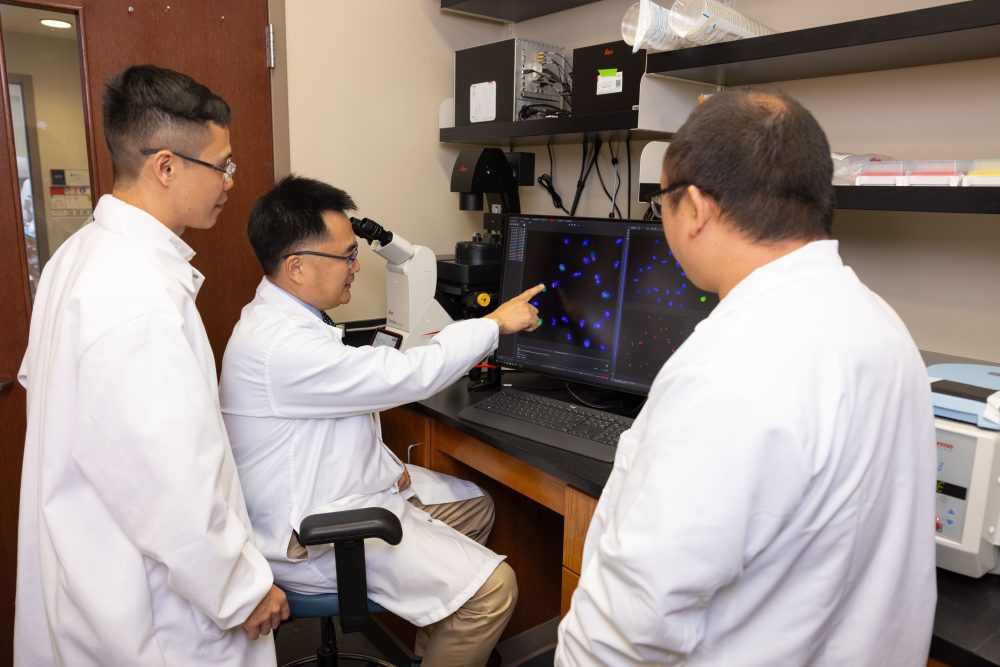
“We demonstrate that APE1 promotes SSB-induced ATM DDR through at least two mechanisms: APE1 exonuclease activity-mediated SSB processing and APE1-mediated direct recruitment of ATM to SSBs,” researchers wrote.
Adding to science’s understanding of SSB DDR is crucial, Zhao said, as the APE1 research could help future clinical trials successfully attack cancer cells or protect non-malignant cells during cancer treatments.
“The more data or information about DNA damage (and repair) we have, the better we may develop treatments for cancer patients,” Zhao said.
Such pioneering work, Richardson added, will continue in the GICI focus group, which is centered in Biological Sciences with over 40 researchers from 10 departments, representing two schools and two university-funded centers.
At the center of GICI is a core group of seven Biological Sciences faculty who research genome integrity. The broader group extends to cancer-omics and computational modeling, cancer therapeutics, and health disparities.

“GICI,” Richardson said, “will synergize with the recent relaunch of the Center of Biomedical Engineering and Science that will enable stronger connections between basic scientists at UNC Charlotte and clinicians at Atrium Health and Wake Forest Medical School.”
For Yan’s part, he’s focused on developing future research at the cellular and molecular levels.
“Any translation of clinical studies must go back to the understanding of these processes … But this is the most difficult part,” he said.
“My philosophy of being a scientist is to do cutting-edge but also leading research. I design my research direction and projects based on my logical understanding. I want to be unique and distinctive from others – I don’t want to be a follower,” said Yan.
College of Science Students Win at Biomedical Sciences Symposium Poster Session
More than 30 research posters competed for prizes at the 2024 Biomedical Sciences Symposium, which took place on Sept. 9 at the Dubois Center at UNC Charlotte Center City. Hosted by the Division of Research and the North Carolina Biotechnology Center, participants included students from UNC Charlotte, the Wake Forest Institute for Regenerative Medicine (WFIRM) and NC State University.
Three winning posters are from the College of Science, taking a prize in each category. UNC Charlotte students from the College of Science, College of Engineering and College of Computing and Informatics (CCI) accounted for half of the awards presented.
“We have excellent training and mentoring of students on our campus and we have fantastic lab facilities. Our undergraduate and graduate students are given hands-on training with state-of-the-art equipment and have opportunities to present their work at conferences and to publish their work,” said College of Science Dean Bernadette Donovan-Merkert. “We continue to build top-tier research enterprises on our campus to support the Charlotte region by training the technical workforce of scientists and engineers of tomorrow.”
College of Science Winners:
Best Poster Award from the Journal Biomolecules:
- Trevor Price*, Sarah Lotz, Katie Reagin, Rae Lee, Kristen Funk: “Investigating the intersection of viral infection, neuroinflammation, and tauopathies,” from the biological sciences Funk Lab.
The prize is the US dollar equivalent of 200 Swiss Franc per team.
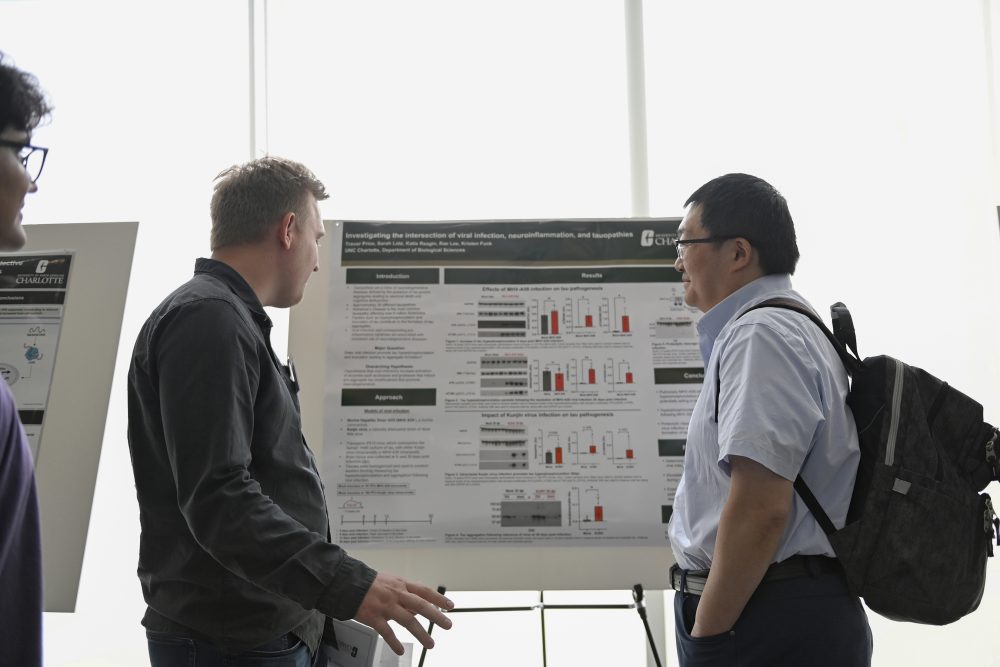
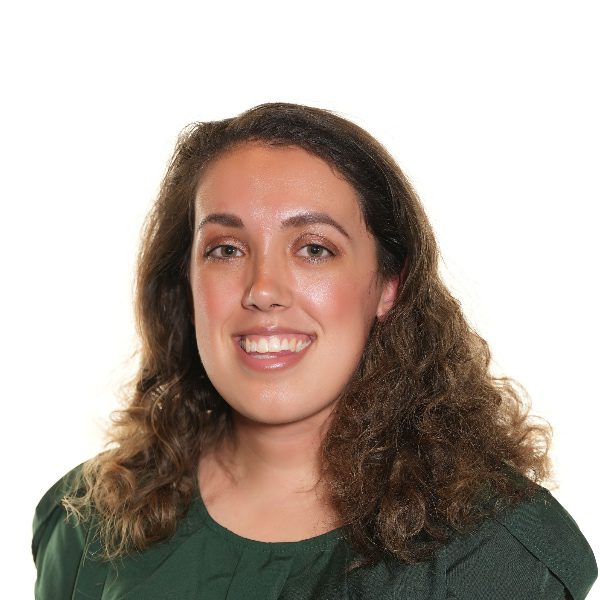
Best Poster Awards from the Biomedical Sciences Symposium
- Infectious Disease topic category winner:
- Kaitlin Klotz, biological sciences Ph.D. student in the Chakrabarti Lab: “Regulation Telomerase Activity in Trypanosoma brucei Through RNA Structural Dynamics and Enzyme Post-Translational Modification”
- Nanomaterials topic category winner:
- Erin Mills, biological sciences Ph.D. student in the Johnson Lab: “Immunomodulatory nucleic acid nanoparticles (NANPs) stimulate protective bone cell responses following S. aureus challenge”
The prize is $200 per team.
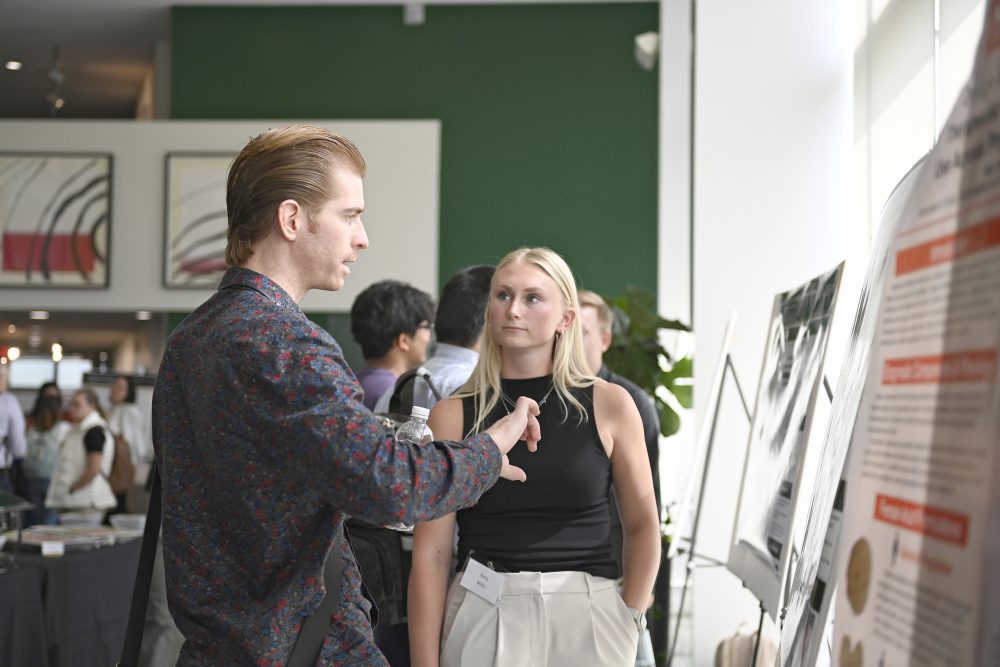
Review the full list of poster award winners on the Biomedical Sciences Symposium website.
Sponsors of the event included: North Carolina Biotechnology Center, Atrium Health, BioCytics, the Carolina BioOncology Institute, and Illumina.
Advancing Frontiers: Exploring New Horizons in Biomedical Sciences
The UNC Charlotte Division of Research and the North Carolina Biotechnology Center hosted the 2024 Biomedical Sciences Symposium on Sept. 9 at the Dubois Center at UNC Charlotte Center City. The symposium offered the opportunity for attendees to “seek catalytic partnerships that can lead to a big vision for building solutions in the biomedical sciences,” said Deb Thomas, associate vice chancellor for the Division of Research.
More than 350 attendees participated in the conference, a day-long event highlighting innovation and translational research featuring speakers, research presentations and poster sessions in topics such as cancer research, regenerative medicine, artificial intelligence in biomedical sciences, diagnostic imaging, infectious diseases and global health, medical devices, and nanomaterials and structure-based drug design.
Thomas cited the importance of hosting the conference on campus after a pandemic pause due to UNC Charlotte’s 272 percent increase in research expenditures in the past decade, the recent establishment of the College of Science and the university’s overall enrollment growth, with 40 percent of Charlotte students in STEM fields.
“We decided this was an inflection moment in the life sciences at UNC Charlotte and that reinvigorating this symposium on our campus is really important, tying us together with the region,” said Thomas.
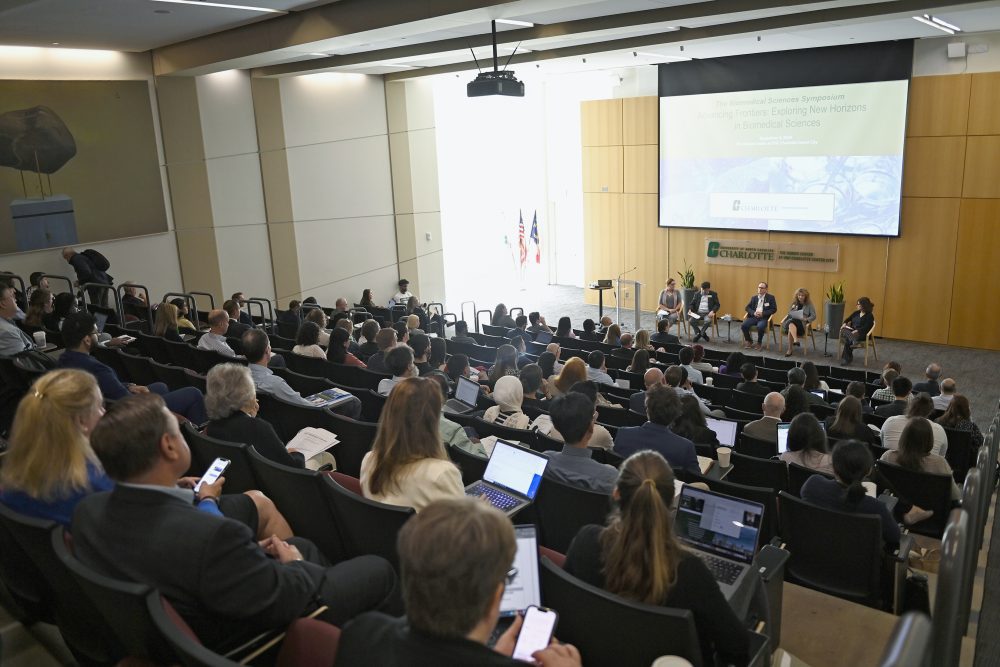
NCBiotech President and CEO Doug Edgeton was a featured speaker and showcased North Carolina’s place as a national leader in the biomedical field, with more than 830 life sciences companies in the state for a workforce of 75,000+ people in manufacturing, contract research and testing, research and development, and agricultural technology. The NCBiotech Charlotte office, which opened in 2006, has supported the strengths of the Charlotte area, outlined by Edgeton as advanced manufacturing and metrology, biomanufacturing, computational life sciences and health informatics, medical devices, and human health and nutrition. “The Charlotte region is such a rich part of the tapestry of the state and we are so blessed to have an area of the state that is growing,” said Edgeton.
A panel of Charlotte college leadership discussed interdisciplinary biomedical research and centers across the university, highlighting the collaborations and innovations from faculty and students. The panelists were: College of Science Dean Bernadette Donovan-Merkert, College of Computing and Informatics Dean Bojan Cukic, William States Lee College of Engineering Dean Rob Keynton and College of Health and Human Services Associate Dean for Research & Graduate Studies Shanti Kulkarni.
The featured speakers continued with Jai Patel, vice president of research at Atrium Levine Cancer Center at Atrium Health, and Anthony Atala, director of Wake Forest Institute for Regenerative Medicine, who discussed genomics and cancer research and advancements in organ transplants. Steve Kearney, chief medical officer at SAS, presented on the applications of artificial intelligence and implications in the biomedical sciences.
The afternoon breakout sessions offered 29 different speakers highlighting their research from medical groups, UNC Charlotte and Wake Forest. A poster session and competition completed the day’s agenda.
The conference also showcased four different biomedical related research centers at Charlotte. Highlights included Daniel Janies, director of CIPHER: Computational Intelligence to Predict Health and Environmental Risks; Juan Vivero-Escoto, director of CITRANS: Center for Innovation, Translational Research and Applications of Nanostructured Systems; XiuXia Du, director of CEMIT: Center for Environmental Monitoring and Informatics Technologies for Public Health; and Pu Wang, co-director of AI Center for Human Digital Twin and Computational Health.
Additional sponsors of the event included Illumina, BioCytics, and the Carolina BioOncology Institute.
College of Science Faculty Named Finalists for Prestigious Teaching Awards
The UNC Charlotte Award for Teaching Excellence honors outstanding non-tenure track teachers on our campus and provides an example of the University’s commitment to excellence in teaching.
This year, two College of Science faculty have been named as finalists for the award and one was recognized with an honorable mention. The winner of the award will be announced at a ceremony on Sept. 5.
Bernadette Donovan-Merkert, dean of the College of Science, said “I am excited to have our College of Science faculty recognized for their outstanding teaching abilities. Our faculty take great care to make their course content meaningful while building students’ confidence to learn difficult subjects and inspiring them to be scientifically inquisitive.”
Susan Michael, senior lecturer, chemistry
Michael is an exceptional teacher who has touched the lives of her students through her desire to get to know each of them individually. She is universally recognized as an excellent teacher by her students and peers.
“As a teacher, I believe it is my responsibility to do four basic things for all of my students,” said Michael. “I must motivate my students to want to learn; I must present the material in a manner that makes it easy for students to learn effectively; I must provide meaningful opportunities for students to use or practice their newly acquired knowledge; and I must assess their learning in a fair and appropriate manner.”
John Taylor, teaching professor, mathematics and statistics
Taylor is a distinguished educator known for his innovative and student-centered approach to teaching mathematics. His teaching philosophy is rooted in motivating students and fostering self-confidence. Taylor’s commitment to education is evident in his development of comprehensive guided notebooks and a library of course videos, which have become invaluable student resources.
“I believe that each student has a unique learning style and that each class requires its own approach,” said Taylor. “I feel it is important to motivate and encourage students and ensure that they maintain a high level of self-confidence. My mission as a teacher is to consider all variables and provide an environment and method that is as effective as possible.”
Andrew Goff, lecturer of biological sciences, was also recognized with an honorable mention.
Matt Parrow Alleviates Neighborhood Concerns Over ‘Blood’ Red Pond
When a subdivision in Union County grew increasingly concerned over a bright red storm water pond, a news station turned to the UNC Charlotte College of Science to get expert answers.
Residents reported the Indian Trail neighborhood’s homeowners association was unresponsive over their concerns that the pond could contain a toxic red algae bloom. With a lack of answers, the neighbors turned to WBTV and provided Channel 3 news with a sample from the pond.
“It looks just like blood,” said the concerned resident in the television interview. WBTV brought a sample of the pond water for investigation to Matthew Parrow, Ph.D., professor of Biological Sciences and associate dean for academic administration.
Parrow was able to examine the water sample under microscopy to determine the source of the red color in the pond.
“This isn’t a algal bloom at all, but actually a plant bloom. Growing on the surface of that pond is a high abundance of water meal and duckweed,” said Parrow. He further explained that they likely proliferated from recent rains, when fertilizer might wash into the slow-moving body of water and give the plants extra food to grow. The red color is an adaptation that protects the plants from sunlight.
The best news that WBTV could take back to the concerned residents is that Parrow assures them the plants are natural and non-toxic for the environment and humans.

Watch the full report from WBTV and Matthew Parrow, Ph.D. testing the pond water.
Bernadette Donovan-Merkert named founding dean of the College of Science
Bernadette Donovan-Merkert has been named as the founding dean of the College of Science after serving in the role for more than a year as interim. Her appointment, approved by the UNC Charlotte Board of Trustees, is effective Aug. 15.
“Bernadette has spent her career at Charlotte supporting our students, leading faculty, promoting innovative research and nurturing the growth of our programs in the STEM fields,” said Jennifer Troyer, provost and vice chancellor for academic affairs. “She is strategically developing the College of Science to align our teaching, community outreach and exemplary research, which is building a talent pipeline serving the Charlotte region and beyond.”
Prior to serving as interim dean, Donovan-Merkert led the Department of Chemistry as chair for more than 18 years. As chair she was integral in the design and development of the Nanoscale Science Ph.D. program and also served as the program director.
“I am thrilled to continue this important work building the College of Science with the collaboration of great leaders and our dynamic faculty,” said Donovan-Merkert. “Science is at the heart of developing an inquisitive, scientifically literate society. We are well positioned as an incubator of innovative teaching and cutting-edge research to support our students, drive discovery and advance partnerships through our community.”
10,000th Rehabilitated Raptor Released on Campus
The College of Science hosted the Carolina Raptor Center as they released their 10,000th rehabilitated raptor on Saturday, Aug. 10. The red-tailed hawk spent 58 days in CRC’s hospital facility and was released into the trees at the Hauser Alumni Pavilion in front of a crowd of guests, including families and CRC volunteers. The event was held on campus where the center was “hatched” 49 years ago, in what is now the Department of Biological Sciences.
CRC’s story began at UNC Charlotte in 1975 when an injured broad-winged hawk was brought to ornithologist Richard Brown, Ph.D., which sparked the idea for a raptor rehabilitation center. In 1981, Brown and student Deb Sue Griffin co-founded the center as a nonprofit organization. In 1984, the nonprofit was in need of more space and moved the center from campus to its current location within the Latta Nature Preserve. The raptor hospital has since evolved into a sophisticated facility capable of providing specialized treatment tailored to the unique needs of these birds and CRC has grown into a leading institution dedicated to the rehabilitation, education, and conservation of birds of prey.
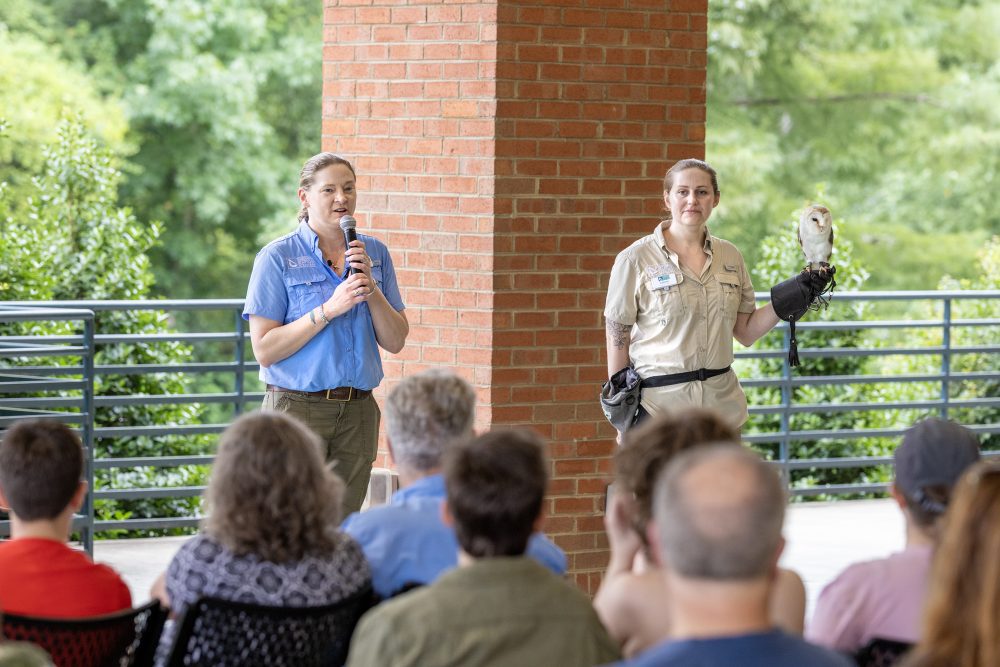
Bernadette Donovan-Merket, interim dean of the College of Science, remarked to the attendees that this event allowed campus to start residential move-in a little early. “We are so excited to welcome this red-tailed hawk to the beautiful and ecologically diverse habitat of the UNC Charlotte campus. The trees are a little different from the dorms, but our campus can certainly take another resident,” said Donovan-Merkert. “We have already told the squirrels to be on the lookout for our newest Niner.”
Katherine Hall-Hertell, associate dean of graduate academic and student affairs, serves as a board member of the organization. “I joined the Board of the Carolina Raptor Center because I am inspired by their mission and vision. When I learned that CRC began at UNC Charlotte, I felt an even stronger commitment and I’m honored to be a bridge between the two organizations,” said Hall-Hertell. “I am so glad we could participate in this impressive achievement. It feels like we are closing a circle releasing this raptor patient at Charlotte.”
“We are incredibly proud to celebrate this milestone at UNC Charlotte, where our journey began,” said Erin Katzner, President and CEO of the Carolina Raptor Center. “Releasing our 10,000th rehabilitated raptor, a hawk, at the place of our inception is a profound moment for all of us. It represents the dedication and hard work of our staff, volunteers, and supporters over the years.”




